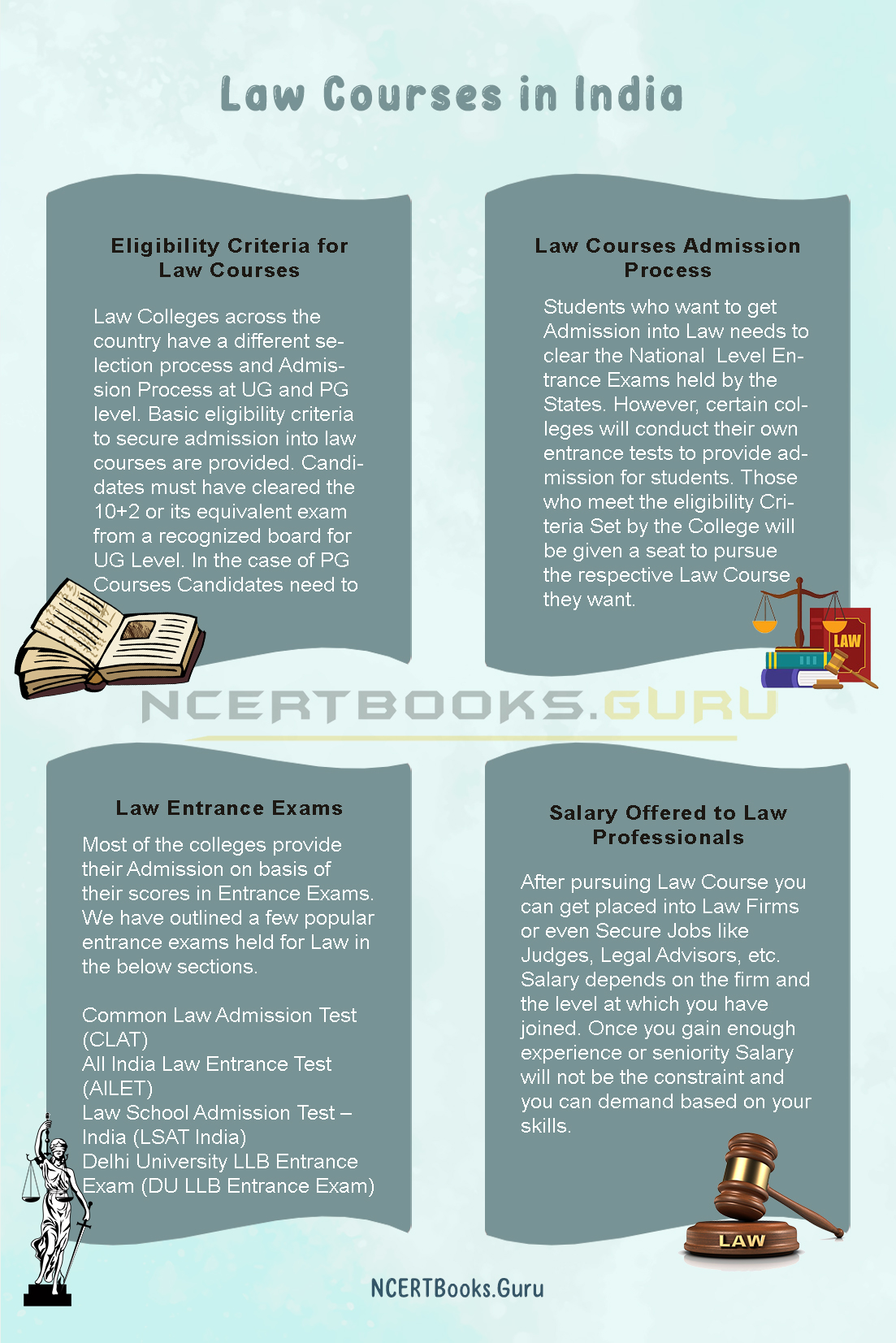Law is a career stream that students undergo at UG, PG, or Doctorate Level to get into the Legal Profession. Law is a Profession that brings a lot of career prospects for students to conquer and explore. Students can pursue various specializations in law depending on their interests. We have curated the Law Courses Admission Process, Eligibility Criteria, Entrance Exams, Fee Structure, Career Options, Top Universities that offer Law Education, etc.
List of Law Courses
Below are some of the Law Courses available. To know each course fee, eligibility criteria, admission process just tap on the quick links available. Before joining the course check for the needed information and clear your concerns.
- LLB Course Details
- Corporate Law Courses
- BA LLB Course
- LLM Course
- List of Law Courses in India
- Master of Law LLM Course Details
- B.Com LLB Course
- BBA LLB Course Details
- LLB Syllabus
- How to become A Judge in India
- How to become A Lawyer in India
- How to become Public Prosecutor in India
- How to become a Supreme Court Judge in India
- How to become a Corporate Lawyer in India
- How to become a District Magistrate in India
- Law Courses after 12th
- Diploma in Law Courses
- Law Courses in Canada for Indian Students
- Online Law Courses in India
- Free Online Law Courses with Certificates in India By Government
- International Law Courses
- Types Of Law Courses
Eligibility Criteria for Law Courses
Law Colleges across the country have a different selection process and Admission Process at UG and PG level. Basic eligibility criteria to secure admission into law courses are provided. Candidates must have cleared the 10+2 or its equivalent exam from a recognized board for UG Level. In the case of PG Courses Candidates need to complete Graduation from a recognized board.
Law Courses Admission Process
Students who want to get Admission into Law needs to clear the National Level Entrance Exams held by the States. However, certain colleges will conduct their own entrance tests to provide admission for students. Those who meet the eligibility Criteria Set by the College will be given a seat to pursue the respective Law Course they want.
Law Entrance Exams
Most of the colleges provide their Admission on basis of their scores in Entrance Exams. We have outlined a few popular entrance exams held for Law in the below sections.
- Common Law Admission Test (CLAT)
- All India Law Entrance Test (AILET)
- Law School Admission Test – India (LSAT India)
- Delhi University LLB Entrance Exam (DU LLB Entrance Exam)
Top Universities that Offer Law Education
- The West Bengal National University of Juridical Sciences, Kolkata
- Rajiv Gandhi National University of Law, Patiala
- Damodaram Sanjivayya National Law University, Visakhapatnam
- National University of Study and Research in Law, Ranchi
- National Law University, Jodhpur, Jodhpur
- Gujarat National Law University, Gandhinagar
- Ram Manohar Lohia National Law University, Lucknow
- Chanakya National Law University, Patna
- National Law University Odisha
- National Law University, Delhi, New Delhi
- National Law School and Judicial Academy, Assam, Guwahati
- Tamil Nadu National Law School, Srirangam
- Hidayatullah National Law University, Raipur
- National University of Advanced Legal Studies, Kochi
- Maharashtra National Law School, Nagpur
Not just these universities there are plenty of institutes out there Online that provide Law Education.
Law Course Duration
Course Duration for each Specialization will vary and you can check out them individually by tapping on the links available. They may range from 1 year to 5 years as well. Some of the People will complete the course, even more, earlier through distance learning.
Law Course Fees
Course Fee for Law varies from institute to institute and course to course. Each College sets its own fee structure depending on the infrastructure, placement offers it provides. So check for the info on the college website and confirm before you join.
Required Skillset for Law Courses after 12th
Other than regular educational qualifications candidates need to possess certain skills inorder to be successful. They are outlined as under
- Good intellect
- Persuasion skills
- Ability to argue on a topic
- Interest in detail
- Fluency and clarity of speech
- Confidence
- Mental and physical stamina
- Convincing skills
- Good judgement of situation/people
Also, Check:
Law Specializations
Law courses in India have various specializations and we have outlined popular specializations in which students can make their career. They are as under
- Civil Law
- Criminal Law
- Cyber Law
- Business Law
- Corporate Law
- Tax Law
- Constitutional Law
- Labour & Employment Law
- Real Estate Law
- Competition Law
- Media Law
- Banking Law
- Intellectual Property Law
- Environmental Law
- International Law
- Mergers and Acquisition Law

Job Options after Law Courses
Students will have Several Opportunities after completing the Law Courses. After pursuing the course students can get into both public and private sectors. Some of the Job Roles for Law Students are given below
- Notary
- Law Reporter
- Government Lawyer
- Legal Advisor
- Judges
- Law Firms
- MNCs
- Business House
- Legal Consultancies
- News Channels
- Judiciary
- Sales tax and Excise Departments
Salary Offered to Law Professionals
After pursuing Law Course you can get placed into Law Firms or even Secure Jobs like Judges, Legal Advisors, etc. Salary depends on the firm and the level at which you have joined. Once you gain enough experience or seniority Salary will not be the constraint and you can demand based on your skills.
FAQs on Law Courses
1. What are the Various Specializations in Law?
The Popular Law Specializations are listed in the following fashion
- Civil Law
- Criminal Law
- Cyber Law
- Business Law
- Corporate Law
- Tax Law
- Constitutional Law
- Labour & Employment Law
- Real Estate Law
- Competition Law
- Media Law
- Banking Law
- Intellectual Property Law
- Environmental Law
- International Law
- Mergers and Acquisition Law
2. What is the Eligibility Criteria required to get into Law?
Candidates must have cleared the 10+2 or its equivalent exam from a recognized board for UG Level. In the case of PG Courses Candidates need to complete Graduation from a recognized board.
3. Which is the most popular Law Course available?
The Most Popular Law Course available is Bachelor of Legislative Law(LLB).
4. Is Choosing Law a Good Career Option?
Yes, Choosing Law is a Good Career Option and there are thousands of law firms in which you can seek jobs after finishing the Law Course.
Final Words
Hope the knowledge shared regarding the Law Courses has enlightened you in some or the other way. To know more about Various Course Details refer to our site. Stay connected to avail latest updates on several courses information in no time.
